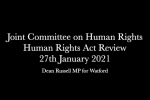Dean Russell: In the broader context, when we are talking about this topic it is a very sensitive topic and different perspectives are given. Some people think it is very harsh not to want to do everything to open the borders. Others are very concerned about people coming over illegally. One of the things that is often talked about is the pull factor, the idea that people are coming across in illegal boats and then being put in hotels, being looked after really well, going through the welfare system and being given lots of opportunities that some might feel is unfair.
I just want to get your sense of how the Bill will address both sides of that, because there is an incredible need for compassion for people who are going through these awful journeys and being taken advantage of by awful, evil serious organised crime gangs. However, there is also an important need to protect our borders and make sure that we are not creating an opportunity for people effectively to sell the UK, for the serious organised crime gangs to say, “Hey, we’ll take you there, and life will be brilliant and the pavement will be gold for you”, and to make it show that we do not have these pull factors. Can you contextualise how the Bill will make a difference on that front?
Tom Pursglove: You have really got to the heart of the issue there, Mr Russell, in saying that of course there are some people who argue that we should have no immigration controls whatever, and there are people on the other side of the argument who say that we should have no immigration whatever. Neither of those positions is practical or reasonable. There are differences of opinion about the way the Bill’s measures are presented, and about some of the issues in the Bill, but broadly speaking there are those of us in this House who would argue that there needs to be reasonable and sensible control of our borders that has preserving human life at its core and is compassionate, shows international leadership, and means that we do right by some of the most vulnerable people on the planet. One of the key messages I have really tried to get across at all stages of scrutiny of this Bill when I have been speaking to it in the House and in the committees is that it is very important that cases are looked at on a case-by-case basis, that all the circumstances of cases are properly taken into account, and that the system is sympathetic and appropriate in the way it handles vulnerabilities and trauma. Sensitive matters like modern slavery I know are of huge concern to Members across the House. These are matters of the most significant gravity and seriousness.
When we operationalise this Bill, I am very mindful that we need to be sympathetic to that and work very much in a way that is mindful of the individuals and that they are not just numbers on a sheet in the immigration statistics. All these individuals are people with real stories. Some people have been through unthinkable tragedy and hardship, and you hear harrowing accounts in this role. That is why safe and legal routes are so important and why we have to put these evil criminal gangs out of business. That is why the policy is firm but, I also think, fair.
The measures in the Bill are comprehensive in trying to deter people from making dangerous crossings and make sure that the thrust of the policy is directed at the evil individuals responsible for bringing people in small boats across the channel. The Bill is also trying to put a system in place whereby those who genuinely are fleeing for their lives and who require sanctuary can get the help and refuge in this country that people would expect. That is the leadership Britain has always shown and will continue to show. I want to reassure the committee that all of that is very much at the forefront of my mind as we take this forward.
Dean Russell: On that point, would you say the Bill addresses all the pull factors, and is it enough to get the serious organised crime gangs to know that the UK is not the destination that they should be looking at, while also helping people understand that they should not go to those routes to try to get somewhere when there are many other legal approaches that they can take around the world?
Tom Pursglove: I want to put these evil criminal gangs out of business wholesale, not just in relation to the United Kingdom but much more widely, because the evil they inflict and the disregard they have for human life is absolutely shocking and appalling, and all in the name of profit. Pull factors are quite difficult to quantify. It is important to recognise and be clear about that, but I go back to the point that all these individuals who are getting in small boats at the moment are coming from safe France or safe Belgium. There is no necessity to leave those countries in a small boat in order to seek refuge and to seek sanctuary. We must always bear that in mind. Pull factors are interesting, because a lot is said about the French position. One of the things the French have quite openly said in the media is that they regard the UK system as very generous, which they argue attracts people to the French coastline in order to make those journeys.
There is, at least anecdotally, an argument there about a pull factor. As I said in answer to Lord Singh’s question at the very outset, the rise in the number of small boat crossings that we have seen, by virtue of the fact that people have seen others managing to get to the United Kingdom in these small boats, has undoubtedly meant that more people have embarked to get to the French coastline to make those journeys, because they have seen others being able to get here. When they have got here, because of the nature of the broken asylum system that we are trying to fix through this Bill, people who have no right to be here are here for far longer than any of us would like. We have to fix that, and we have to sever the link between people thinking that getting in a small boat and getting to the United Kingdom guarantees that you will stay here.



